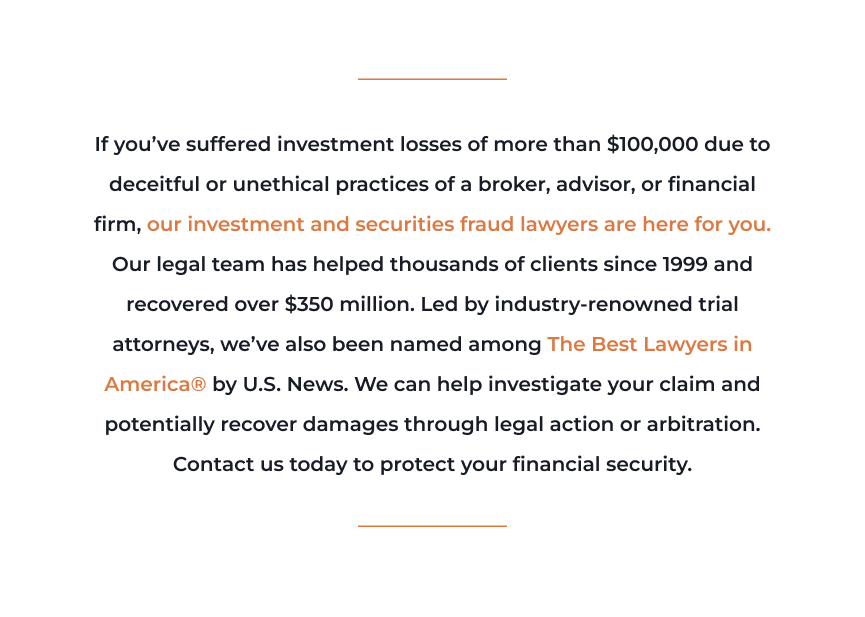If you lost over $100,000 because a financial advisor sold you autocallable structured notes, you’re not alone. These complex products carry risks that many investors don’t understand until it’s too late. An experienced autocallable notes investment loss lawyer can help determine if misconduct was involved.
Not all investment losses result from fraud. But when a financial advisor recommends an unsuitable product or fails to explain the downsides, that’s misconduct. As investment fraud lawyers, we hold financial firms accountable when they violate the rules.
Meyer Wilson Werning has recovered over $350 million for clients nationwide. We’re here to help you understand your rights, evaluate your case, and pursue justice through FINRA arbitration.
Understanding Autocallable Notes
Autocallable notes are structured financial products that offer high yields through periodic coupon payments. The issuer automatically calls these notes before maturity if the performance of one or more reference assets meets specific conditions at certain times during the product’s term.
For example, the product is automatically called if the reference asset is at or above its initial level on a specified observation date. Payment upon autocall varies, with some products offering full return of principal and others exposing investors to loss of principal.
While these products can offer attractive returns, they come with significant risks that are often not fully disclosed to investors. The complexity of autocallable notes makes them unsuitable for many retail investors, particularly those with moderate or conservative risk profiles.
We Are The firm other lawyers
call for support.
Risks Associated with Autocallable Notes
Investing in autocallable notes involves several risks:
- Market risk: The performance of the linked asset or index may cause you to lose some or all of your principal. Depending on the nature of the linked asset or index, the market risk of the structured note may include changes in equity or commodity prices, interest rates, or market volatility.
- Illiquidity: Autocallable notes are not listed on an exchange, and there’s no guarantee of a secondary market for trading them. This lack of liquidity can make it difficult to sell the investment before maturity.
- Credit risk: Structured notes are unsecured debt obligations of the issuer. If the issuer defaults on these obligations, investors may lose some or all of the principal amount they invested.
- Complexity and misrepresentation: The intricate structure of autocallable notes can lead to misunderstandings about their true nature and risks. Some financial advisors may misrepresent these products as safe alternatives to traditional fixed-income investments, leading to unsuitable recommendations.
Signs of Advisor Misconduct
If your financial advisor recommended autocallable notes without fully explaining the associated risks, or if they misrepresented the product’s safety and suitability, this could constitute misconduct. Common red flags include:
- Unsuitable recommendations: Advising clients to invest in high-risk products that don’t align with their investment objectives or risk tolerance.
- Misrepresentation or omission: Failing to disclose the full risks associated with the investment or providing misleading information.
- Overconcentration: Allocating a significant portion of a client’s portfolio to autocallable notes, increasing exposure to potential losses.
- Lack of due diligence: Recommending products without thoroughly understanding their structure and risks.
If you’ve experienced any of these issues, it’s essential to consult with an autocallable notes investment loss attorney to assess your situation.
We Have Recovered Over
$350 Million for Our Clients Nationwide.
Recovering Your Losses through FINRA Arbitration
Most disputes between investors and advisors go through FINRA arbitration, a process that resembles court. Both sides present evidence, question witnesses, and make arguments before a panel that delivers a final, binding decision.
Arbitration often resolves cases faster than court and takes place privately—hearings aren’t open to the public. We treat every case like it’s going to trial, preparing thoroughly to strengthen your position.
Most investors don’t realize they’ve signed contracts requiring arbitration. That makes it critical to have a legal team that knows how to build a strong case for the panel deciding the outcome.
Our lawyers are nationwide leaders in investment fraud cases.
How We Can Help
At Meyer Wilson Werning, we focus on representing investors who have suffered losses due to the misconduct of financial advisors and firms. Our team has over 75 years of combined experience and has recovered more than $350 million for clients across the country.
We offer:
- Personalized attention: We intentionally maintain a low-volume caseload to ensure each client receives the time and resources necessary to build a strong case. You’ll work directly with an experienced attorney, not passed off to an assistant or junior associate.
- Experienced legal team: Our attorneys are nationally recognized in investment fraud litigation and bring deep experience with FINRA arbitration. Founding partner David Meyer has led investor advocacy groups like PIABA and worked with the SEC and Congress to promote stronger protections.
- Contingency fee structure: We work on a contingency fee basis, meaning you don’t pay any upfront fees, and we only get paid if we recover money for you. This structure allows you to pursue justice without adding financial strain.
- Sophisticated case building: We use advanced technology and a dedicated legal support team to manage every detail. From forensic account analysis to expert testimony, we bring the firepower necessary to take on large financial firms.
Our focus remains on clients who lost over $100,000 due to misconduct, not bad market luck, not general investment decline, and not scam operations that happened without a broker or advisor involved.
If you aren’t sure whether your situation qualifies, we’ll review your documents and give you a clear answer.
Speak with an Autocallable Notes Investment Loss Lawyer Today
Autocallable notes can be complex and risky investments that are not suitable for all investors. If a financial advisor recommended these products without fully disclosing the risks or assessing their suitability for your investment profile, you might have grounds for a claim.
Working with an experienced autocallable notes investment loss lawyer gives you the chance to hold the advisor or firm accountable through FINRA arbitration.
At Meyer Wilson Werning, we have the experience and resources to pursue recovery on your behalf. Contact us today for a free consultation and learn how we can help protect your financial future.
Recovering Losses Caused by Investment Misconduct.



